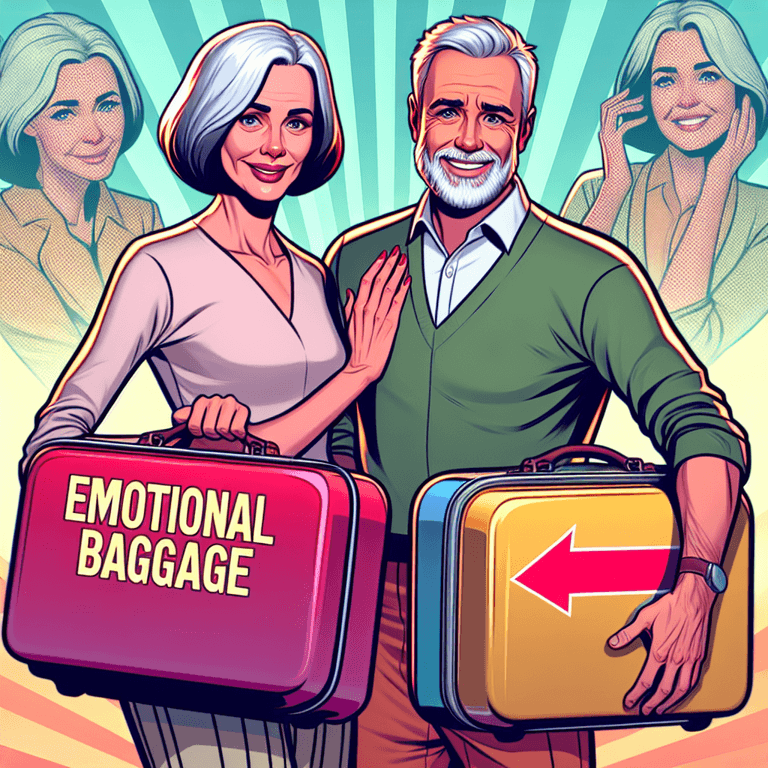Dealing With Emotional Baggage

Dealing With Emotional Baggage in Senior Dating
We recognize that emotional baggage from past relationships, losses, and life changes can significantly impact your senior dating journey by creating trust issues, communication barriers, and a fear of vulnerability. These unresolved feelings often manifest as persistent social withdrawal, defensive responses, or turning dates into therapy sessions. The key lies in recognizing how past experiences shape current connections, practicing gradual vulnerability, and maintaining realistic expectations about companionship over perfection. Below, we’ll explore specific strategies to help you navigate these emotional challenges successfully.
Key Takeaways
- Recognize signs of emotional baggage like persistent withdrawal, difficulty trusting partners, and conversations that feel like therapy sessions.
- Communicate openly about past concerns and expectations to foster a safe environment that allows trust to develop gradually.
- Seek professional therapy or support groups to process unresolved trauma from previous relationships, loss, or significant life changes.
- Practice gradual vulnerability exercises and self-reflection to rebuild emotional intimacy while accepting that healing takes time and patience.
- Focus on realistic expectations, prioritizing companionship and emotional support rather than perfection in senior dating relationships.
Understanding What Emotional Baggage Means for Seniors
When we enter the senior dating scene, we’re not just bringing decades of life experience—we’re carrying the emotional weight of every significant relationship, loss, and disappointment that has shaped us.
This emotional baggage represents unresolved psychological trauma, including stressors, trust issues, fears, guilt, and regret, that manifests as lingering pain affecting our current behavior. **emotional baggage** can include unresolved emotions and conditioned responses from past experiences that impact our interactions with potential partners.
The psychological impact influences how we perceive ourselves and potential partners, often leading to lower self-esteem or increased mistrust.
Our past relationships create invisible barriers that distort how we see ourselves and judge potential romantic partners.
We might find ourselves heightening sensitivity in social situations or avoiding intimacy altogether. Sometimes we unconsciously seek partners not to build healthy connections, but to resolve childhood pain that remains unaddressed from our earliest formative experiences.
This accumulated emotional weight from widowhood, retirement, and health declines can intensify unresolved issues, making it more challenging to form new connections unless we actively address these deeply embedded patterns.
Common Sources of Emotional Baggage in Later Life
As we navigate our later years, accumulated life experiences create distinct patterns of emotional baggage that differ considerably from those we carried in younger decades.
Significant life changes like retirement, spousal death, or health decline often trigger deep emotional responses that reshape our attachment styles and self-perception. Past traumatic experiences, including abuse, military service, or medical crises, can resurface as vulnerability barriers that complicate new relationships. Emotional readiness is essential for overcoming these barriers and finding new love.
Three primary sources dominate our emotional landscape:
- Relationship History – Multiple divorces, betrayals, and trust issues create fear of intimacy.
- Unresolved Trauma – Childhood abuse, financial hardship, or accidents generate persistent emotional triggers.
- Social Isolation – Disconnection from community support systems amplifies past regrets.
Recognizing these relationship patterns helps us develop healthier coping mechanisms and healing strategies for meaningful connections. For those dealing with age-related cognitive changes, these emotional responses can become even more pronounced, as individuals often mirror emotional cues from their partners, potentially amplifying both positive and negative feelings in romantic relationships.
Recognizing Signs of Unresolved Emotional Issues
We need to recognize that unresolved emotional issues don’t always announce themselves clearly—they often emerge through subtle warning signs that can impact our dating relationships. These red flags might include persistent social withdrawal, difficulty trusting new partners, or unexplained anxiety when forming connections. Additionally, dates that feel more like therapeutic sessions can signal that someone is struggling with unprocessed emotional wounds that require professional support rather than romantic involvement. Embracing vulnerability in dating can help individuals address and heal from these unresolved emotional issues, fostering healthier connections.
Warning Signs to Watch
Red flags in senior dating often manifest as patterns of behavior that signal unresolved emotional wounds from past relationships.
When we’re evaluating a potential partner’s emotional readiness, we need to pay attention to how they discuss their relationship history and whether they’ve engaged in meaningful emotional healing. Recognizing trust issues from past experiences can also help us understand their current emotional state.
Key warning signs include:
- Persistent negativity about exes – constant blame without accepting personal responsibility for relationship failures
- Emotional immaturity – avoiding vulnerability, punishing our emotional expression, or requiring constant validation
- Commitment avoidance – keeping the relationship status undefined or responding defensively when we discuss plans
Trust your instincts if something feels off. Inconsistent communication patterns, such as erratic calls or frequent last-minute cancellations, often reveal underlying emotional unavailability.
We deserve partners who have done the work to integrate past experiences constructively, rather than transferring unresolved issues into new relationships.
Communication Patterns Matter
When potential partners consistently struggle with basic communication skills, their words often reveal deeper emotional wounds that haven’t healed. We can recognize these communication barriers through chronic patterns of defensiveness, blame-shifting, or emotional shutdown during conversations.
Pay attention to partners who avoid emotional expression altogether or become overwhelmed when discussing feelings. Open communication is essential for fostering understanding and trust in relationships, enabling partners to address their emotional baggage effectively.
Healthy relationships require safe spaces where both people practice empathy and understanding without judgment. Notice if someone can’t engage in open dialogue about past relationships or becomes hostile when receiving constructive feedback. These responses often signal unresolved trauma.
Self-awareness plays a significant role in recognizing these patterns. If conversations consistently end in arguments or silence, we’re witnessing emotional baggage manifesting through communication dysfunction that needs professional attention. Additionally, watch for partners who find that serious topics become consistently difficult or feel too risky to bring up in conversation.
How Past Experiences Impact New Relationships
Although we might hope to start fresh in new relationships, our past experiences inevitably shape how we connect with potential partners in senior dating.
Research shows that past relationships influence the patterns in our current romantic connections, affecting everything from our communication styles to our expectations. Understanding the effects of emotional baggage helps us navigate senior dating more consciously. Positive cognitive models from previous healthy relationships can be generalized to new romantic contexts, enhancing our ability to form meaningful connections. Additionally, engaging in open communication about our past can foster deeper emotional intimacy and trust with new partners, allowing us to build stronger connections.
Recognizing how past relationships shape our dating patterns empowers us to make more intentional choices in love.
Our previous relationships impact new connections through:
- Attachment patterns – Early life experiences form attachment styles that influence how we bond and resolve conflicts with new partners.
- Relational uncertainty – Discussing past partners or experiencing similar issues can increase anxiety and avoidance behaviors in current relationships.
- Partner selection – We often unconsciously seek partners with similar personality traits to our ex-partners, recreating familiar dynamics.
Red Flags to Watch for When Dating
Key warning signs include rushing intimacy, financial manipulation, and extreme criticism of past partners. These behaviors often signal unresolved emotional baggage that can destabilize relationships. Seniors must be particularly cautious, as romance scams targeting their demographic frequently exploit these vulnerabilities.
| Warning Sign Category | Specific Behaviors | Impact on Relationship |
|---|---|---|
| Emotional Patterns | Mood swings, inability to apologize | Creates instability |
| Financial Focus | Money requests, hidden debts | Indicates ulterior motives |
| Social Control | Isolating from friends, avoiding introductions | Limits personal freedom |
We shouldn’t ignore these red flags, hoping they’ll improve with time. Given that seniors over 60 lost $4.9 billion to online fraud in 2024, being vigilant about potential scammers who exploit loneliness is especially crucial in senior dating.
Building Trust Despite Past Hurts
When we’ve been hurt before, building trust in new relationships requires us to acknowledge our wounds while actively working to prevent them from controlling our future connections.
We can establish open communication patterns by sharing our concerns and boundaries early in the relationship, creating a foundation where both partners feel safe to express their needs and fears. Practicing emotional intelligence enhances these conversations, allowing for a deeper understanding of one another’s feelings.
Research shows that older adults who openly discuss expectations and engage in trust-building activities—from shared experiences to honest conversations about past relationships—experience greater success in forming lasting, meaningful partnerships. With 34% experiencing isolation in the past year among adults aged 50 to 80, addressing emotional baggage becomes even more crucial for creating genuine connections that combat loneliness and foster deeper intimacy.
Overcoming Past Relationship Wounds
Past relationship wounds can create significant barriers to forming new connections in our senior years, yet they don’t have to define our romantic future.
We can actively work toward healing and developing emotional resilience through intentional practices.
Effective healing practices that build emotional resilience include:
- Professional therapy or support groups – These provide safe spaces to process trauma and develop healthy coping mechanisms.
- Self-reflection and forgiveness are effective. Understanding our patterns while releasing resentment toward ourselves and past partners can help cultivate self-compassion on our journey to healing.
- Gradual vulnerability exercises – Slowly opening up to trusted individuals to rebuild our capacity for emotional intimacy.
We must remember that healing isn’t a linear process.
Some days we’ll feel stronger than others, and that’s completely normal. While many older adults find online dating challenging, with 57% of women 50 and older reporting negative experiences, building trust through healing work remains essential regardless of how we choose to meet new people.
The key lies in consistent effort and patience with ourselves as we navigate this journey toward healthier relationships.
Establishing Open Communication Patterns
How do we rebuild trust when our hearts still carry the scars of previous betrayals and disappointments? Trust building requires consistent, honest interactions that demonstrate reliability over time. We must practice emotional openness by sharing our experiences and expressing our feelings clearly to prevent misunderstandings. Additionally, fostering shared experiences can enhance the connection and deepen trust between partners.
| Trust Building Actions | Expected Outcomes |
|---|---|
| Regular, honest communication | Establishes reliability patterns |
| Sharing past experiences transparently | Reduces fears and assumptions |
| Active listening without judgment | Creates emotional safety |
Vulnerability becomes our strength when we create safe spaces for open dialogue. By paying attention to both verbal and non-verbal cues, we demonstrate genuine care for our partner’s emotional state. When we feel heard and understood, trust naturally strengthens, allowing deeper intimacy to flourish despite our past wounds. Establishing boundaries around digital privacy helps mature couples navigate modern relationship challenges while respecting each other’s personal space.
Age and Gender Differences in Dating Approaches
While emotional baggage affects senior daters universally, understanding how age and gender shape dating approaches can help us navigate these relationships more effectively. Research shows distinct patterns that influence dating dynamics and relationship priorities as we age.
Men remain more active in dating, comprising nearly two-thirds of older daters, while women increasingly prioritize independence and focus on romantic partnerships. These gender roles create unique emotional challenges requiring different dating strategies.
Key factors affecting senior dating approaches include:
- Age preferences – Men often seek larger age gaps, while women focus on compatibility.
- Social connections – Women emphasize emotional bonds; men consider health and dating resources.
- Online experiences – Digital platforms present varying challenges based on age and gender.
Understanding these differences helps us develop emotional resilience and adapt our dating strategies accordingly.
Strategies for Addressing Your Emotional Baggage
Before we can build healthy new relationships, we must honestly examine the emotional wounds and unresolved issues we’re carrying from our past experiences.
This process requires us to step back and objectively assess our patterns, reactions, and triggers without the filter of defensiveness or denial.
Recognize Unresolved Past Issues
Recognizing unresolved past issues requires honest self-reflection and careful attention to our emotional responses during dating experiences.
We can identify emotional baggage by observing our emotional triggers and recurring dating patterns that sabotage potential connections.
Here are three key indicators to watch for:
- Fear-based responses – Notice when we feel overwhelming anxiety, distrust, or avoidance during intimate conversations or deeper emotional connection attempts.
- Negative self-talk patterns – Pay attention to persistent thoughts about our unworthiness or expectations that relationships will inevitably fail.
- External feedback – Listen to trusted friends or family members when they point out concerning behavioral patterns in our dating approach.
These warning signs often indicate we haven’t fully processed grief, divorce trauma, or other significant losses that require healing before we can invest authentically in new relationships.
Practice Objective Self-Reflection
Once we’ve identified our emotional baggage, practicing objective self-reflection becomes essential for understanding how these unresolved issues affect our dating behaviors and relationship choices.
This self-discovery journey requires honest examination of our patterns, triggers, and emotional responses without judgment or denial.
Mindfulness practices enhance our emotional awareness, helping us recognize when past wounds influence our present decisions.
We can engage in activities that promote personal growth, such as journaling or meditation, to deepen our understanding of ourselves.
Seeking perspectives from trusted friends or therapists can provide valuable insights that we might miss on our own.
Through consistent self-reflection, we develop the self-compassion necessary for emotional healing, ultimately preparing ourselves for healthier, more authentic relationships that aren’t overshadowed by unresolved past experiences.
Build Emotional Self-Awareness
Emotional self-awareness forms the cornerstone of addressing our emotional baggage and creating healthier dating relationships in our senior years.
When we perceive our emotions and their impact on others, we’re better equipped to navigate the complexities of senior dating with confidence and authenticity.
Building this awareness requires consistent practice through proven strategies:
- Regular mindfulness and meditation – These practices help us recognize emotional triggers before they overwhelm our responses.
- Journaling for reflection – Writing down our thoughts creates space for deeper self-understanding and emotional release.
- Self-awareness exercises – Structured activities that help us identify patterns in our emotional responses and reactions.
These tools enable us to approach dating with greater emotional intelligence, fostering empathy and understanding while managing our responses effectively.
Communication Techniques for Difficult Conversations
How can we transform emotionally charged conversations into opportunities for deeper connection in senior dating?
We can start by employing “I” statements to express our feelings without triggering defensiveness. When we say “I feel hurt when…” instead of “You always…” we break down communication barriers and demonstrate emotional intelligence.
Active listening becomes essential – we must validate our partner’s experiences while maintaining a calm demeanor.
Open-ended questions, such as “Help me understand how that affected you,” encourage deeper sharing and mutual understanding.
We should summarize key points periodically to guarantee clarity.
By selecting suitable settings and timing, we foster a psychological environment where honest exchanges can flourish.
These techniques transform potential conflicts into bridges toward genuine intimacy and trust.
Moving Forward With Realistic Expectations
While mastering communication skills provides the foundation for meaningful dialogue, we must also ground ourselves in realistic expectations about what senior dating can genuinely offer.
Our priorities naturally shift toward companionship, shared values, and emotional support rather than traditional romantic ideals. We’re more likely to seek partners who complement our established lifestyles and respect our independence.
Understanding these realistic parameters supports both emotional healing and sustainable relationship growth:
- Accept that perfection isn’t the goal – Previous experiences have taught us that meaningful connections matter more than flawless partnerships.
- Prioritize emotional readiness over timeline pressure – We can take the necessary time to process our baggage without rushing into commitments.
- Value quality interactions over quantity – Fewer, deeper connections often prove more fulfilling than numerous superficial encounters.
Questions
Should I Disclose My Emotional Baggage on the First Date?
We recommend avoiding detailed discussions of emotional baggage on first dates. Effective disclosure strategies involve waiting until mutual trust develops. Focus on evaluating your emotional readiness and building rapport before sharing deeper personal history.
How Long Should I Wait After Loss Before Dating Again?
Like healing from surgery, we can’t rush your grieving process with arbitrary timelines. There’s no standard waiting period—your dating readiness emerges naturally when you’ve processed your loss and feel emotionally prepared for companionship.
Can Therapy Help Me Prepare for Senior Dating?
We recommend therapy as it offers significant benefits for seniors preparing for dating. Professional counseling enhances your emotional readiness by processing past experiences, building communication skills, and developing the self-esteem necessary for healthy relationships.
What if My Adult Children Disapprove of My Dating?
We recognize that adult children’s disapproval can feel painful, but you don’t need parental approval for your dating decisions. We recommend establishing clear relationship boundaries through honest conversations about your intentions and gradually introducing potential partners when appropriate.
Is It Normal to Feel Guilty About Dating After Spouse’s Death?
Yes, we acknowledge that feeling guilty about dating after your spouse’s death is entirely normal. Grief processing involves conflicting emotions, and effective guilt management consists of recognizing that loving again doesn’t diminish the significance of your previous relationship.
Final Thoughts
We’ve learned that emotional baggage doesn’t have to be the anchor that drags down our dating experiences. By acknowledging our past, communicating openly, and approaching new relationships with realistic expectations, we can transform yesterday’s wounds into today’s wisdom. Research consistently shows that seniors who address their emotional histories develop more meaningful connections. Let’s remember that every relationship offers opportunities for growth, healing, and the possibility of finding love again.
References
- https://www.liviajohnson.com/odds-of-finding-love-after-50
- https://www.seniormatch.com/senior-dating-blog/the-challenges-of-dating-in-later-life-why-it-s-tough-for-older-individuals
- https://globalcounselingsolutions.org/red-flags-when-dating-in-your-50s/
- https://www.60plusclub.com.au/social/dating-perceptions-experiences-for-over-60s-gender-age-group-relationship-status/
- https://thoughtsonlifeandlove.com/what-to-expect-when-dating-in-your-forties/19990/
- https://en.wikipedia.org/wiki/Emotional_baggage
- https://www.choosingtherapy.com/emotional-baggage/
- https://www.healthline.com/health/mind-body/how-to-release-emotional-baggage-and-the-tension-that-goes-with-it
- https://www.psychologytoday.com/us/blog/the-power-prime/202206/how-emotional-baggage-is-functional-then-dysfunctional
- https://www.griefworkcenter.com/blog/unpack-your-emotional-baggage/
- https://memory.ucsf.edu/caregiving-support/behavior-personality-changes
- https://www.psychologytoday.com/us/blog/the-power-of-parallels/202307/everyone-has-baggage-including-you
- https://www.silversneakers.com/blog/surprising-depression-causes-older-adults/
- https://pure-medical.co.uk/mental-health/how-to-get-rid-of-emotional-baggage-and-the-tension-it-causes
- https://www.psychologytoday.com/us/blog/magical-enlightenment/202107/normal-pitfalls-of-dating-when-older
- https://thesanfordschool.asu.edu/sites/g/files/litvpz486/files/2023-12/RDLL-Report_2023.pdf
- https://pmc.ncbi.nlm.nih.gov/articles/PMC5469370/
- https://www.seniormatch.com/senior-dating-blog/what-percentage-of-seniors-are-single
- https://psychcentral.com/relationships/age-difference-in-relationships
- https://www.seniormatch.com/senior-dating-blog/what-is-a-red-flag-when-dating-in-your-60s


One Comment